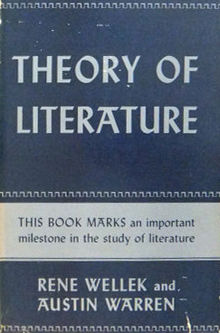Theory of Literature

Dust jacket, first edition
|
|
| Author | |
|---|---|
| Country | United States |
| Language | English |
| Subject | Literary scholarship |
| Publisher | Harcourt, Brace, and Company |
|
Publication date
|
|
| Media type | Hardcover |
| Pages | 403 |
| OCLC | 1599846 |
Theory of Literature is a book on literary scholarship by René Wellek, of the structuralist Prague school, and Austin Warren, a self-described "old New Critic". The two met at the University of Iowa in the late 1930s, and by 1940 had begun writing the book; they wrote collaboratively, in a single voice over a period of three years. Its contents were based on their shared understandings of literature.
Originally consisting of twenty chapters – one was cut in later editions – Theory of Literature describes various aspects of literary theory, criticism, and history. After defining various aspects and relationships of literature in general, Wellek and Warren divide analysis of literature based on two approaches: extrinsic, relating to factors outside a work such as the author and society, and intrinsic, relating to factors within such as rhythm and meter. They stress the need to focus on the intrinsic elements of a work as the best way to truly understand it. In doing so they adapt the phenomenology used by Roman Ingarden.
Published by Harcourt, Brace, and Company in December 1948, Theory of Literature received mixed reviews from the academic community. It was used to teach literary theory beginning soon after publication and remained in common use into the 1960s. Its success has been credited as introducing European literary scholarship into the US and crystallizing a movement towards intrinsic literary criticism. Theory of Literature saw three editions and has been translated into more than twenty languages.
René Wellek (1903–1995) was an Austrian-born scholar from the structuralist Prague school of linguistics, studying under Vilém Mathesius. Wellek had training in classical literature and was fluent in several European languages, both Romance and Slavic. His theoretical training included the phenomenology of Edmund Husserl, as used in Roman Ingarden's work, and the psychologically influenced linguistics of Karl Bühler. After Nazi Germany occupied Prague in 1939, Wellek fled London – where he had been teaching – for the United States, teaching at the University of Iowa under Norman Foerster.
...
Wikipedia
